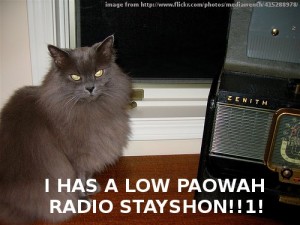On Friday the FCC announced that it will take up the final implementation of the Local Community Radio Act at its November 30 open meeting. The commissioners will also consider final procedures to deal with more than 6000 pending applications for FM translator repeater stations. These issues overlap because translators compete for the same spots on the dial as LPFM stations. The actual rules and procedures to be decided have yet to be released by the Commission.
Low-power FM advocates, the National Association of Broadcaster, religious broadcasters, NPR and others have all been weighing in with their final comments to the FCC. In September the Prometheus Radio Project visited with Commissioner Mignon Clyburn to urge the creation of a second adjacent frequency waiver process for LPFM stations. Such a waiver currently exists for translator stations, which operate at power levels similar to, and higher than, LPFM stations. These waivers permit them to be spaced closer to full-power stations on the dial, provided the translator doesn’t cause unacceptable interference. Closer spacing would open up the opportunity to have more LPFM community stations, especially in crowded urban markets.
The NAB had its own meeting with the FCC’s Media Bureau Audio Division in October to weigh in against such a waiver. The broadcast lobby offered its own take on the LCRA, saying that it generally prohibits LPFM stations to be on the second adjacent, and that waivers “should be considered only in truly exceptional circumstances.”
National Public Radio takes an only slightly softer approach on the issue, one that is couched in terms of not creating burdens for new low-power stations. Counsel from NPR met with Commissioner Robert McDowell’s office in October to urge that second adjacent waivers,
“occur only under limited circumstances as Congress intended so that newly constructed LPFM stations are not forced to ameliorate interference problems, including by terminating service.”
Both NPR and the NAB maintain their opposition somewhat paradoxically, given the fact that they appear perfectly fine with second adjacent waivers for translator stations. The only difference between translators and LPFM stations is who owns and programs them (and they’re not likely to be NAB or NPR affiliates).
The major religious broadcaster Educational Media Foundation has written to the FCC in defense of translators, given that it has already nearly 200 such stations licensed in the 2003 window. EMF continues to oppose the nationwide cap on the number of translator applications one party can file which the FCC proposed in March. EMF notes that it has 300(!) applications still pending, with more than 50 for small, rural markets. If forced to choose only 50 to comply with a cap, EMF argues that “many of these applications would likely be dismissed… depriving service to residents of these communities.”
A group of parties hoping to apply for new LPFM licenses submitted comments taking umbrage with one of EMF’s assertions in support of its anti-cap argument. EMF wrote, “there is not a spectrum shortage for translators and there is also likely to be less demand for LPFM applications outside of the metropolitan areas.” Therefore EMF concludes, “any forced dismissal of translator applications outside of the major markets does not significantly advance LPFM opportunities.”
The group calls this statement “non sequitur,” arguing that,
“more spectrum for competing applicants to share does not automatically equal enough spectrum for all competing applicants. In affected areas, increasing the total pool of applicants by dismissing fewer translators, will reduce the odds for a typical LPFM applicant.”
A different religious group, the United Church of Christ, joined the Leadership Conference on Civil and Human Rights to ask the FCC to “ensure all low power radio stations will carry a minimum of locally-originated programming.” Ostensibly, they’re urging the Commission not to let LPFM licensees turn their stations into translator repeaters under a different name.
In the run up to the FCC’s last consideration of LPFM, planned for its March meeting, we anxiously awaited release of the orders under consideration. The Commission ended up releasing them a couple of days ahead of the meeting, deleting the item from their agenda. Given that the Commission has to vote on final rules and procedures I’m guessing, and hoping, there will be actual discussion at the November meeting. I also hope the Commission will release its final proposals ahead of the meeting, too.



